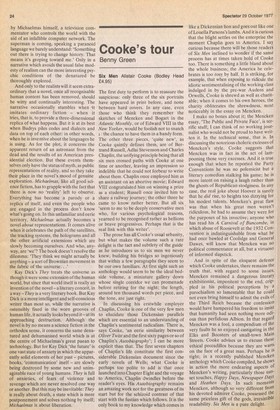Cooke 's tour
Benny Green
Slx Men Alistair Cooke (Bodley Head £4.95) The first duty to perform is to reassure the suspicious: only three of the six portraits have appeared in print before, and none between hard covers. In any case, even those who think they remember the sketches of Mencken and Bogart in the Atlantic Monthly, or of Edward VIII in the New Yorker, would be foolish not to snatch : the chance to have them in a handy form. The other three pieces, 'quite new', as Cooke qaintly defines them, are of Bertrand Russell, Adlai Stevenson and Charles Chaplin, the unifying principle being that all six men crossed paths with Cooke at one time or another, leaving an impression so indelible that he could not forbear to write about them. Chaplin once employed him as an assistant on an abortive movie; Edward VIII congratulated him on winning a prize as a student; Russell once invited him to share a railway journey; the other three he came to know rather better. But all six 'seem to me to be deeply conservative men who, for various psychological reasons, yearned to be recognised rather as hellions or brave progressives. Perhaps that is the real link with this writer'.
The prose has all Cooke's usual urbanity, but what makes the volume such a rare delight is the tact and subtlety of the guide as he introduces us to six men we never knew, building his bridges so ingeniously that within a few paragraphs they seem to be our own familiars. At first sight such an anthology would seem to be the ideal bedside volume, a miniature gallery down whose single corridor we can promenade before retiring for the night; the length, around ten thousand words per piece, and the tone, are just right.
In discussing his erstwhile employer Chaplin, Cooke is one of the very few men to elucidate those Dickensian parallels which are essential to an understanding of Chaplin's sentimental radicalism. There is, says Cooke, 'an eerie similarity between Oliver Twist and the first sixty pages or so of Chaplin's Autobiography'; I can be more explicit than that. The first seven chapters of Chaplin's life constitute the first considerable Dickensian document since the early novels of Wells; what Cooke is perhaps too polite to add is that once launched into Chapter Eight and the voyage to America, Chaplin dwindles before the reader's eyes. His Autobiography remains an amazing work not for the greatness of its start but for the schizoid contrast of that start with the fustian which follows. It is the only book to my knowledge which comes in like a Dickensian lion and goes out like one of Louella Parsons's lambs. And it is curious that the blight settles on the enterprise the moment Chaplin goes to America. I say curious because there will be those readers of Six Men inclined to wonder if the same process has at times taken hold of Cooke too. There is something a little bland about the whole business; , the America he celebrates is too rosy by half, It is striking, for example, that when exposing to ridicule the idiotic sentimentalising of the working class indulged in by the pre-war Audens and Orwells, Cooke is shrewd as well as charitable; when it comes to his own heroes, the charity obliterates the shrewdness, most noticeably in the essay on Mencken.
I make no bones about it; the Mencken essay, 'The Public and Private Face', is terrific stuff; I can think of no working journalist who would not be proud to have written it. In the technical sense, that is. In discussing the notorious choleric excesses of Mencken's style, Cooke suggests that Mencken was in fact in the act of lampooning those very excesses. And it is true enough that when he reported the Party Conventions he was no polemicist but a literary comedian stalking his game; he is more intent on raising a laugh rather than the ghosts of Republican stodginess, In any case, the real joke about Hoover is surely that he did rise, to heights too dizzying for his modest talents. Mencken's great flaw was that when his great men weren't ridiculous, he had to assume they were for the purposes of his invective; anyone who has read his A Carnival of Buncombe, in which abuse of Roosevelt at the 1932 convention is indistinguishable from what he had once bawled at Coolidge and General Dawes, will know that Mencken was no political commentator at all, but a virtuoso of informed slapstick.
And in spite of the eloquent defence which Cooke undertakes, there remains the truth that, with regard to some issues, Mencken remained a dangerous literary exhibitionist, impenitent to the end, crippled in his political perceptions by a parochialism so lamentable that he could not even bring himself to admit the evils of the Third Reich because the confession would have hampered his freedom to insist that humanity had seen nothing more odious than perfidious Albion. In that regard Mencken was a fool, a compendium of the very faults he so enjoyed castigating in the Elks and Boosters of small-town Main Streets. Cooke advises us to excuse these ethical peccadillos because they are warts on the face of a great man. Perhaps he is right; in a recently published Mencken anthology which Cooke compiled, he shows in action the more endearing aspects of Mencken's writing, particularly those sunset touches, Happy Days, Newspaper Days and Heathen Days. In such moments Mencken, although so very different from his devoted admirer Cooke, possessed the same priceless gift of the gods, irresistible readability. Six Men is a pure delight,


































 Previous page
Previous page